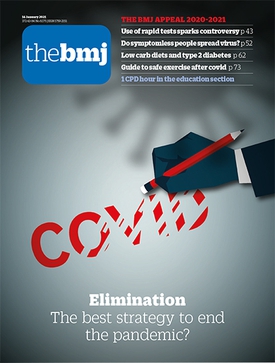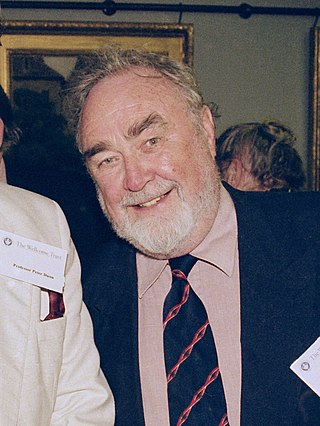Related Research Articles
Evidence-based medicine (EBM) is "the conscientious, explicit and judicious use of current best evidence in making decisions about the care of individual patients." The aim of EBM is to integrate the experience of the clinician, the values of the patient, and the best available scientific information to guide decision-making about clinical management. The term was originally used to describe an approach to teaching the practice of medicine and improving decisions by individual physicians about individual patients.

A randomized controlled trial is a form of scientific experiment used to control factors not under direct experimental control. Examples of RCTs are clinical trials that compare the effects of drugs, surgical techniques, medical devices, diagnostic procedures or other medical treatments.
Internal medicine, also known as general internal medicine in Commonwealth nations, is a medical specialty for medical doctors focused on the prevention, diagnosis, and treatment of internal diseases in adults. Medical practitioners of internal medicine are referred to as internists, or physicians in Commonwealth nations. Internists possess specialized skills in managing patients with undifferentiated or multi-system disease processes. They provide care to both hospitalized (inpatient) and ambulatory (outpatient) patients and often contribute significantly to teaching and research. Internists are qualified physicians who have undergone postgraduate training in internal medicine, and should not be confused with "interns”, a term commonly used for a medical doctor who has obtained a medical degree but does not yet have a license to practice medicine unsupervised.

The BMJ is a weekly peer-reviewed medical journal, published by BMJ Group, which in turn is wholly-owned by the British Medical Association (BMA). The BMJ has editorial freedom from the BMA. It is one of the world's oldest general medical journals. Previously called the British Medical Journal, the title was officially shortened to BMJ in 1988, and then changed to The BMJ in 2014. The journal is published by BMJ Publishing Group Ltd, a subsidiary of the British Medical Association (BMA). The current editor-in-chief of The BMJ is Kamran Abbasi, who was appointed in January 2022.
A medical error is a preventable adverse effect of care ("iatrogenesis"), whether or not it is evident or harmful to the patient. This might include an inaccurate or incomplete diagnosis or treatment of a disease, injury, syndrome, behavior, infection, or other ailment.

Sports medicine is a branch of medicine that deals with physical fitness and the treatment and prevention of injuries related to sports and exercise. Although most sports teams have employed team physicians for many years, it is only since the late 20th century that sports medicine emerged as a distinct field of health care. In some countries, sports medicine is a recognized medical specialty. In the majority of countries where sports medicine is recognized and practiced, it is a physician (non-surgical) specialty, but in some, it can equally be a surgical or non-surgical medical specialty, and also a specialty field within primary care. In other contexts, the field of sports medicine encompasses the scope of both medical specialists as well as allied health practitioners who work in the field of sport, such as physiotherapists, athletic trainers, podiatrists and exercise physiologists.
A medical specialty is a branch of medical practice that is focused on a defined group of patients, diseases, skills, or philosophy. Examples include those branches of medicine that deal exclusively with children (paediatrics), cancer (oncology), laboratory medicine (pathology), or primary care. After completing medical school or other basic training, physicians or surgeons and other clinicians usually further their medical education in a specific specialty of medicine by completing a multiple-year residency to become a specialist.

The ICMJE recommendations are a set of guidelines produced by the International Committee of Medical Journal Editors for standardising the ethics, preparation and formatting of manuscripts submitted to biomedical journals for publication. Compliance with the ICMJE recommendations is required by most leading biomedical journals. Levels of real compliance are subject to debate. As of 9 January 2020, 5570 journals worldwide claim to follow the ICMJE recommendations.
David Lawrence Sackett was an American-Canadian physician and a pioneer in evidence-based medicine. He is known as one of the fathers of Evidence-Based Medicine. He founded the first department of clinical epidemiology in Canada at McMaster University, and the Oxford Centre for Evidence-Based Medicine. He is well known for his textbooks Clinical Epidemiology and Evidence-Based Medicine.
A public health intervention is any effort or policy that attempts to improve mental and physical health on a population level. Public health interventions may be run by a variety of organizations, including governmental health departments and non-governmental organizations (NGOs). Common types of interventions include screening programs, vaccination, food and water supplementation, and health promotion. Common issues that are the subject of public health interventions include obesity, drug, tobacco, and alcohol use, and the spread of infectious disease, e.g. HIV.

The Medical Repository was the first American medical journal, founded in 1797 and published quarterly, with some interruptions, through 1824. It was printed by T. & J. Swords, printers to the physics faculty at Columbia College in New York City.

John P. A. Ioannidis is a Greek-American physician-scientist, writer and Stanford University professor who has made contributions to evidence-based medicine, epidemiology, and clinical research. Ioannidis studies scientific research itself, meta-research primarily in clinical medicine and the social sciences.

Major-General Sir Robert McCarrison, CIE, FRCP was a Northern Ireland physician and nutritionist in the Indian Medical Service, who was made a Companion of the Indian Empire (CIE) in 1923, received a knighthood in July 1933, and was appointed as Honourable Physician to the King in 1935.
Bullying in the medical profession is common, particularly of student or trainee physicians. It is thought that this is at least in part an outcome of conservative traditional hierarchical structures and teaching methods in the medical profession which may result in a bullying cycle.

Choosing Wisely is a United States-based health educational campaign, led by the ABIM Foundation, about unnecessary health care.
Metascience is the use of scientific methodology to study science itself. Metascience seeks to increase the quality of scientific research while reducing inefficiency. It is also known as "research on research" and "the science of science", as it uses research methods to study how research is done and find where improvements can be made. Metascience concerns itself with all fields of research and has been described as "a bird's eye view of science". In the words of John Ioannidis, "Science is the best thing that has happened to human beings ... but we can do it better."

Conflicts of interest (COIs) often arise in academic publishing. Such conflicts may cause wrongdoing and make it more likely. Ethical standards in academic publishing exist to avoid and deal with conflicts of interest, and the field continues to develop new standards. Standards vary between journals and are unevenly applied. According to the International Committee of Medical Journal Editors, "[a]uthors have a responsibility to evaluate the integrity, history, practices and reputation of the journals to which they submit manuscripts".

Geoffrey Victor Price Chamberlain was professor and academic head of the department of obstetrics and gynaecology at St George's Hospital, London, editor-in-chief of the British Journal of Obstetrics and Gynaecology and president of the Royal College of Obstetricians and Gynaecologists (RCOG). At one time, he was president of the obstetrics and gynaecology section at the Royal Society of Medicine. He also authored numerous textbooks and journal articles on obstetrics.
Charles Richard Box (1866–1951) was an English physician, surgeon, and anatomist.
Sir Arthur Massey was a British medical doctor and author. He was the medical officer of Coventry and author of Epidemiology in Relation to Air Travel (1933). In 1950, he became honorary physician to King George VI.
References
- ↑ Stevens, Lise M.; Lynm, Cassio; Glass, Richard M. (2006-04-19). "Medical Journals". JAMA. 295 (15): 1860. doi: 10.1001/jama.295.15.1860 . ISSN 0098-7484. PMID 16622154.
- 1 2 Smith, R. (2006). "The trouble with medical journals". Journal of the Royal Society of Medicine . 99 (3): 115–119. doi:10.1177/014107680609900311. PMC 1383755 . PMID 16508048.
- ↑ Booth, C C (1982-07-10). "Medical communication: the old and new. The development of medical journals in Britain". British Medical Journal (Clinical Research Ed.). 285 (6335): 105–108. doi:10.1136/bmj.285.6335.105. ISSN 0267-0623. PMC 1498905 . PMID 6805825.
- ↑ Kahn, Richard J.; Kahn, Patricia G. (2009-08-20). "The Medical Repository — The First U.S. Medical Journal (1797–1824)". New England Journal of Medicine. 337 (26): 1926–1930. doi:10.1056/nejm199712253372617. PMID 9407162.
- ↑ Smith, Richard (2005-05-17). "Medical Journals Are an Extension of the Marketing Arm of Pharmaceutical Companies". PLOS Medicine. 2 (5): e138. doi: 10.1371/journal.pmed.0020138 . ISSN 1549-1676. PMC 1140949 . PMID 15916457.
- ↑ MacDonald, Stuart (2023). "The gaming of citation and authorship in academic journals: a warning from medicine". Social Science Information. 61 (4): 457–480. doi:10.1177/05390184221142218. S2CID 256710783.